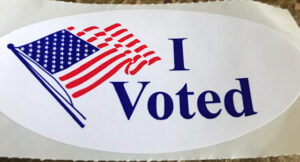 by Joe Fitzgerald
by Joe Fitzgerald
Fifteen months ago, I wrote the following about last year’s Harrisonburg City Council elections:
We need people, independent or party, who value pragmatism over ideology. And we need people who know the difference between pragmatism and cynicism, and the difference between opportunity and opportunism. This would be the year for people who are concerned, in the words of an ancient Greek poet, about what is right and good for their city, and are willing to sacrifice the time, treasure, and energy to work for those concerns.
The Harrisonburg Democratic Committee reacted by kicking me off a database I’d been using to help candidates for 20 years, and continued a nomination process marked by two deeply flawed caucuses. The year ended with a council dominated by ideological opportunists. (The reference to the database is thrown in to highlight absurdity; you get it or you don’t.)
Next year three out of five City Council members will be on the ballot. Mayor Reed, elected eight years ago as “Everywoman,” has since grown to become the moral center of the council. The other two are a man with the personal behavior of a person half his age and a woman who, in the immortal words of Jed Bartlett, has turned being un-engaged into a Zen-like thing.
In that same West Wing scene, Bartlett says, “We should have a great debate. We owe it to everyone.” Wouldn’t it be pretty to think so?
There is a class of people in the city, from the serious to the absurdist, who have managed to keep up with or remain engaged in local politics even with the diminution of local journalism. Many would probably like to see that great debate about the city’s future. Right now they’re asking questions like “What are the Democrats going to do?” and “Will the Republicans run anybody?”
The follow-up questions might include “Which Democrats?” The 300 or so people who thought they were participating in legitimate caucuses last year? The 13,000 or so who’ll vote for the Democratic nominee for president? The two dozen who show up for a committee meeting? It’s hard to say.
“Which Republicans?” The committee that hasn’t nominated a successful city council candidate since 2014? The 7,000 or so who’ll vote for the Republican nominee next year, even if it’s Trump? Maybe the ones going door to door saying School Board members are grooming children?
Just as local journalism has shrunk, so have the local parties. When people wonder what the party committees will do, they’re like the joke about the man falling from a cliff who grabs a thin branch and prays, “Is there anybody up there?” When a voice from the mist says to have faith and let go of the branch, the man asks, “Is there anybody else up there?”
The catch in local politics is there’s nobody else up there. Thomas Edsall writing in The New York Times tells us, “there is something else hurting cities besides those well-known phenomena that we don’t talk about enough: the erosion of the local establishment and the loss of civic and corporate elites.” Here as elsewhere, “elites” has become a term of derision for some, to the extent that elitism has joined the other “isms” thrown around in dismissive and derisive terms. The idea that somebody somewhere can’t be better than someone else at something is part of giving us the government we deserve.
Somebody somewhere in Harrisonburg needs to think about the future of the city in terms of pragmatic, workable solutions to worsening problems, and about leadership driven not by ideology and opportunism but by civic duty.
Joe Fitzgerald is a former mayor of Harrisonburg.
Republished with permission from Still Not Sleeping.


